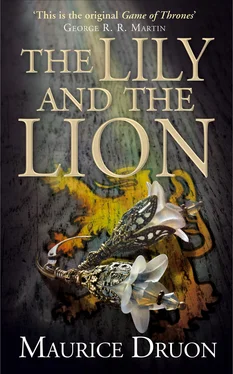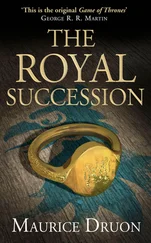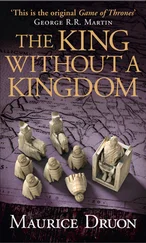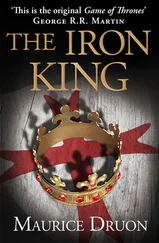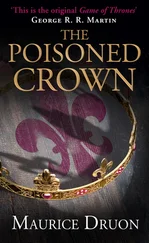1 ...7 8 9 11 12 13 ...19 And then a king must also be wise, the wisest man among his people. Philippe began to adopt a sententious tone and, in that fine voice of his, to utter weighty aphorisms in which could be distinguished something of the manner of his old tutor, Archbishop Guillaume de Trye.
‘Action should always be based on reason,’ he would say whenever he was at a loss.
And when he made a mistake, which was often enough, and found himself in the unhappy position of having to countermand what he had ordered the day before, he would declare superbly: ‘Reason lies in developing one’s ideas.’ Or again: ‘It is better to be forearmed than forestalled,’ he would announce pompously, though throughout the twenty-two years of his reign he was to be constantly at the disadvantage of having to face one disagreeable surprise after another.
No monarch ever uttered so many platitudes with so grand an air. When people supposed he was thinking, he was in fact merely pondering a sentence that would seem like thought; his head was as empty as a nut in a bad season.
Nor was it to be forgotten that a king, a true king, must be valiant, chivalrous and gallant. And, indeed, Philippe had no aptitude for anything but arms – not for war, it must be admitted, but for jousts and tournaments. He would have excelled in training young knights at the Court of a minor baron. But, being a sovereign, his house began to look like a castle in the romances of the Round Table, which were much read at the time and had taken firm hold of his imagination. Life was a round of tournaments, festivals, banquets, hunts and entertainments, followed by more tournaments amid a flurry of plumed helms and horses more richly caparisoned than were the women.
Philippe applied himself with great devotion to affairs of State for an hour a day, either on his return, drenched with sweat, from jousting or on emerging from a banquet with a full stomach and a cloudy mind. His chancellor, his treasurer and his innumerable officers made his decisions for him or went to take orders from Robert of Artois. Indeed, Robert governed far more than the Sovereign.
No difficulty arose without Philippe appealing to Robert for advice, and the Count of Artois’ orders were obeyed with confidence, for it was known that any decree of his would be approved by the King.
This was how things stood, when the crowds began to gather towards the end of May for the coronation, at which Archbishop Guillaume de Trye was to place the crown on his former pupil’s head, and the festivities were to last for five days.
The whole kingdom seemed to have come to Reims; and not only the kingdom but a great part of Europe, for there were present the superb, if impecunious, King John of Bohemia, Count Guillaume of Hainaut, the Marquess of Namur, and the Duke of Lorraine. During the five days of feasting and rejoicing, there were a lavishness and an expenditure such as the burgesses of Reims had never seen before, and it was they who had to foot the bill for the festivities. Though they had grumbled at the cost of the previous coronation, they now gladly supplied two or three times as much. It was a hundred years since there had been such drinking in the Kingdom of France. There were even horsemen serving drinks in the courts and squares.
On the eve of the coronation, the King dubbed Louis of Nevers, Count of Flanders, knight with great pomp and ceremony. It had been decided that the Count of Flanders was to carry Charlemagne’s sword at the coronation and hand it to the King. The Constable, whose traditional privilege it was, had oddly enough consented to surrender it. But it was necessary that the Count of Flanders should be a knight; and Philippe VI could hardly have found a more signal means of showing his gratitude for the Count’s support.
Nevertheless, at the ceremony in the cathedral next day, when Louis of Bourbon, the Great Chamberlain of France, had shod the King with the lily-embroidered boots, and then proceeded to summon the Count of Flanders to present the sword, the Count made no move.
‘Monseigneur, the Count of Flanders!’ called Louis of Bourbon once again.
But Louis of Nevers stood still in his place with his arms crossed.
‘Monseigneur, the Count of Flanders,’ repeated the Duke of Bourbon, ‘if you be present, either in person or by representative, I call on you to come forward to fulfil your duty. You are hereby summoned to appear under pain of forfeiture.’
There was an astonished silence beneath the great vault and there was fear, too, reflected on the faces of the prelates, barons and dignitaries; but the King seemed quite unconcerned and Robert of Artois, his head thrown back, appeared to be deeply engaged in watching the play of sunlight through the windows.
At last the Count of Flanders moved from his place, came to a halt in front of the King, bowed and said: ‘Sire, if Louis of Nevers had been called, I would have come forward sooner.’
‘What do you mean, Monseigneur?’ replied Philippe VI. ‘Are you not Count of Flanders?’
‘Sire, I bear the name but do not enjoy its benefit.’
Philippe VI, looking as kingly as possible, drew himself up, turned his long nose towards the Count, and said calmly with a blank stare: ‘What is this you’re telling me, Cousin?’
‘Sire,’ replied Louis of Nevers, ‘the people of Bruges, Ypres, Poperinghe and Cassel have turned me out of my fief and no longer consider me to be their count and suzerain; indeed, the country is in such a state of rebellion that I can scarcely go to Ghent even in secret.’
Philippe of Valois slapped the arm of the throne with his wide palm in a gesture he had unconsciously adopted from having seen his uncle, Philip the Fair, the incarnation of majesty, make use of it so often.
‘Louis, my dear cousin,’ he said – and his stentorian voice seemed to roll out of the choir and over the congregation – ‘we look on you as Count of Flanders and, by the holy anointing and sacrament we receive today, promise that we shall know neither peace nor rest till you are restored to the possession of your county.’
Louis of Nevers fell on his knees and said: ‘Sire, I thank you.’
The ceremony then proceeded.
Meanwhile Robert of Artois was winking at his neighbours, and they at once realized that the scene had been previously arranged. Philippe VI was keeping the promises Robert had made on his behalf to assure his election. And, indeed, Philippe of Evreux was that very day wearing the crown of King of Navarre.
As soon as the ceremony was over, the King summoned the peers and the great barons, the princes of his family, and the lords who had come from beyond the boundaries of his realm to attend his coronation and, as if the matter could not suffer an hour’s delay, consulted with them as to the timing of an attack on the Flanders rebels. A valiant king was in duty bound to defend the rights of his vassals. A few of the more prudent spirits, in view of the fact that the season was already far advanced and that there was a risk of not being ready till the winter – they still remembered Louis the Hutin’s ‘Muddy Host’ – counselled him to postpone the expedition for a year. But the old Constable Gaucher cried shame on them: ‘For him who has the heart to fight the time is always ripe!’
He was now seventy-eight and eager to command his last campaign; and it was not for shuffling of this sort that he had agreed to surrender Charlemagne’s sword.
‘And the English, who are at the back of the rebellion, will be taught a lesson,’ he muttered.
After all, in the romances of chivalry you could read of the exploits of eighty-year-old heroes still capable of unhorsing an enemy in battle and cleaving his helm to the skull. Were the barons to show less valour than this aged veteran who was so impatient to set off to war with his sixth king?
Читать дальше
